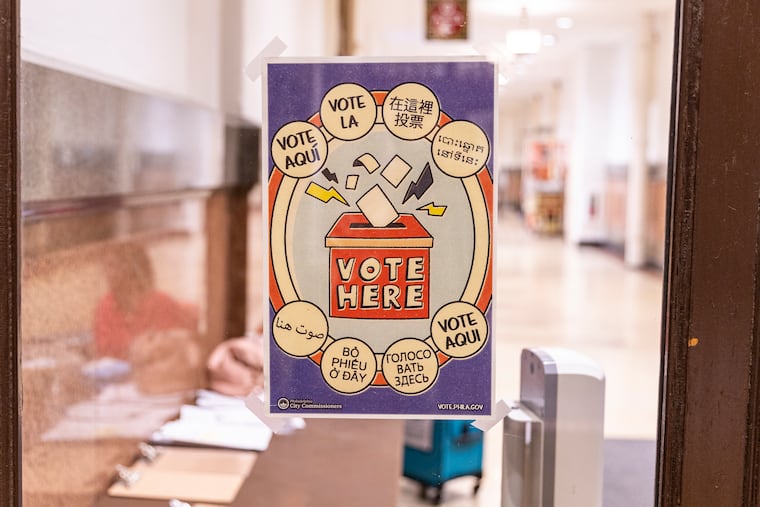Local elections matter. Voters must take heed. | Editorial
The Inquirer Editorial Board has made endorsements in a number of city, county, and statewide races, but there are many other races worth voters’ attention.

Although Election Day is fast approaching on Tuesday, many local elections have gathered little attention. Despite the impact these elections have on crime, education, taxes, housing, economic development, and many other issues, many citizens can’t be bothered to stay informed, let alone vote.
In 2019, only 25% of registered voters cast a ballot in Philadelphia’s mayoral election.
Voter apathy is partly due to many local races lacking a credible challenger. While the mayoral and City Council at-large elections attracted large, strong fields this year, half of Philadelphia’s district Council members faced no opponents in either the primary or general election.
The Inquirer Editorial Board has made endorsements in a number of city, county, and statewide races to help better inform voters. A lack of an endorsement is not a judgment on the significance of any office or race. Indeed, there are many local races worth voters’ attention.
» READ MORE: The Inquirer’s 2023 General Election Endorsement Guide
In New Jersey, control of the state legislature, held by Democrats for the last two decades, is in play. Gov. Phil Murphy has not been ambitious enough when it comes to solving the state’s biggest challenges. Recently, he’s been overly focused on overturning New York’s congestion pricing and getting his wife elected to the U.S. Senate.
This has given some life to Republican candidates, who are also using culture war issues to stoke fear in voters. The circus in the Republican-controlled House in Washington is a preview of what could happen in Trenton if the GOP won control of either House.
It would likely make finding solutions harder, not easier, for issues such as funding NJ Transit or building enough affordable housing. Exhibit A is incumbent State Sen. Edward Durr, whose knuckle-dragging stance on abortion is to tell women they have “a choice” to keep their “legs closed.” This is what passes for policymaking?
In Chester County, voters will elect three county commissioners. Incumbents Marian Moskowitz and Josh Maxwell have amassed a strong record. Under their leadership, Chester County has become the only Southeastern Pennsylvania suburban county to build a significant amount of much-needed housing.
In Delaware County, Republicans have cast District Attorney Jack Stollsteimer as a soft-on-crime progressive. Stollsteimer, however, is far from being Larry Krasner’s suburban clone. While he has increased second chances and non-carceral interventions, he’s also been clear about holding all offenders accountable and spearheading programs like the Chester Partnership for Safe Neighborhoods, which has helped to curb gun violence.
Back in Philadelphia, voters should support a ballot question to amend the City Charter to create a permanent Office for People with Disabilities. The office already exists but could be disbanded by future mayors. More than 17% of Philadelphians live with a disability. A permanent representative can continue to work to address issues such as ensuring the city complies with requirements in the Americans with Disabilities Act, including curb cuts.
In dual races for Pennsylvania’s Superior Court, Democrats Jill Beck and Timika Lane understand that partisan politics has no place in courtrooms. Both are highly rated by the Pennsylvania Bar Association and have a distinguished record of service. Republican Harry F. Smail Jr. garnered just a standard recommendation from the bar, while Maria Battista was not recommended due to failure to participate.
Most of the judicial candidates this board spoke with in this election cycle endorsed the concept of electing judges. While addressing whether judges should be appointed or elected to the bench is a discussion worth having, it is clear that the offices of sheriff and Register of Wills should not directly depend on voters.
With little attention paid to them, these offices tend to be captured by Democratic machine-adjacent politicians, who use them as costly patronage mills instead of a form of public service.
Former Sheriff John Green was sentenced to five years in prison for misconduct in office. The current sheriff, Rochelle Bilal, threw him a going away party. The incumbent’s tenure has also been marred by multiple allegations of misconduct, with the loss of guns held by her office being the most egregious.
Register of Wills Tracey Gordon was accused by multiple employees of trying to extract campaign donations in exchange for continued employment. She lost her primary, but her replacement is a longtime ward leader, John Sabatina.
Both offices should be abolished. Instead of elected positions, their functions should be moved into the court system and mayoral administration, as appropriate.
In the meantime, it is up to voters to hold officeholders accountable and make their voices heard at the ballot box. As former President Barack Obama once said, this November, don’t boo — vote.